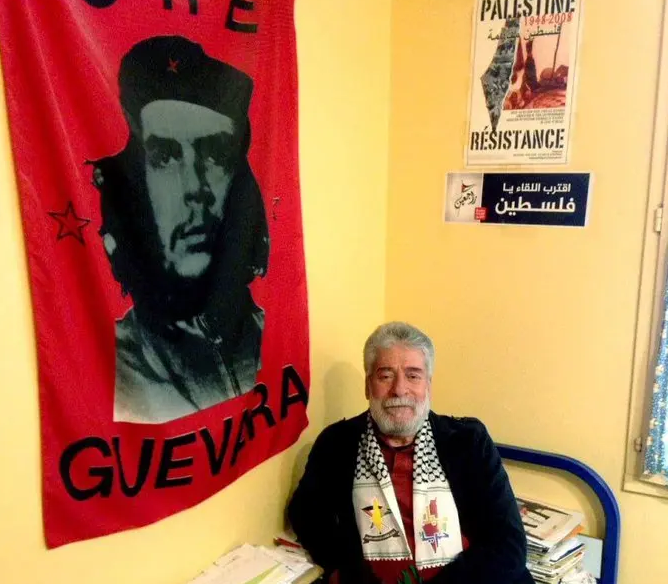
It was a principled struggle years in the making.
Europe’s longest-held prisoner, Georges Ibrahim Abdallah, became an icon of unmitigated resistance when he returned to join the Popular Front for the Liberation of Palestine, using his anti-colonial worldviews to align with the subjugated and send a clear message to US and Israeli conspirators: enough is enough.
Now, after France kept the resistance figure locked up for four decades without due process, his anticipated release makes some fundamental realities clear. First, it shows that Israeli and US designs to keep Abdallah out of public sight remain self-destructive, after the latter spent considerable diplomatic and intelligence capital to prevent his release, despite meeting all legal conditionalities for an early release over two decades ago. Second, his release makes it increasingly clear that resistance can trump repression. Third, it exposes the truth about France’s hypocrisy.
Abdallah’s liberation should be seen as a hole in the US efforts to wage war on resistance figures. This is a US regime that spared no effort to willingly obstruct the legal process of his case, deliberately skirting realities around a truly judicial process, and instead choosing to put political clothing on the process. It sends a powerful message to all the unlawfully detained resistance figures, from Lebanese heroes to scores of Palestinian fighters, that Abdallah refused to extend any form of compensation to secure his release.
This sentiment echoes principles of integrity, anti-colonial resistance, and genuine human dignity that are the lifeblood of perseverance. One of Washington and Tel Aviv’s fundamental objectives was to undercut momentum from international rights organizations and press for Abdallah’s retention behind bars through covert maneuvering. This has been demonstrated through their continued oversight of lax French judicial proceedings, including the reluctance of former French Interior Minister Manuel Valls to free Abdallah from prison. Abdallah, who enjoys considerable support from his base as part of the Lebanese Armed Revolutionary Factions, may view his long-sought break from prison as a measure of what solidarity can deliver.
As Jacques Attali, senior advisor to then-French President François Mitterrand, made clear, there was hardly any actionable evidence against Abdallah for his charges. For a figure to have resisted direct US influence in shaping French prospects on his parole, it is a heartening sight for Abdallah to embrace liberation on the back of grassroots pressure. Lebanese rights groups, for instance, were instrumental in establishing that Abdallah’s imprisonment was politically motivated as opposed to a true measure of legal justice. The pains of waiting through decades, despite significant reservations over the impartiality of French judicial conduct, send a powerful message on perseverance, revealing Paris’ hypocrisy on actual and fabricated offenses. As Abdallah’s lawyer at the time of his widely controversial ‘life sentence’ made certain, the move – and its condemnable political motivations – were tantamount to a “declaration of war.”
Grass-roots mobilization wasn’t simply a fact evident in parts of the Arab world. In France alone, Abdallah was celebrated as a symbol of freedom that is worthy of liberation. Look no further than the yearly demonstrations outside Lannemezan Prison in the south: such activism provided solid proof that Abdallah wasn’t only embedded within the Lebanese political discourse, courtesy of his resilience, dedication to the Palestinian cause, and other attributes of braving colonial influence. Instead, Abdallah was a recurring theme of resistance strength in the face of a lax diplomatic movement on his decades-old case in France. By refusing to own grassroots momentum on Abdallah’s rights and long overdue justice, France reveals its striking double standards on entertaining freedoms.
For all the talk about upholding a rules-based system where shared values strike at the core of stability, Abdallah’s status as Europe’s longest-serving political prisoner puts a blemish on those claims. Palestine’s undying determination to withstand criminal Zionist aggression is proof that the weight of genuine values, morality, and justice needs to focus on the repressed, not those who facilitate Zionist aggression.
Abdallah’s firm conviction for that cause marks a natural point of friction with Paris, which has endorsed “Israel’s” genocidal crimes, its so-called “right to defend itself,” and is, among other Western states, complicit in atrocities to this day. With French misconduct and Abdallah’s activism on two different sides of the pole, his release becomes all the more noteworthy. “We’re delighted. I didn’t expect the French judiciary to make such a decision nor for him to ever be freed, especially after so many failed requests for release,” said Robert Abdallah, his brother. “For once, the French authorities have freed themselves from Israeli and US pressures.”
Thus understood, Abdallah’s hard-fought liberation should be seen as a telling defeat of Zionist-US pressure campaigning and evidence that focused support for resistance figures can bear fruit. As “Israel’s” raging genocide in Gaza shows, efforts to take out political prisoners, or even silence them, cannot succeed.
Abdallah’s transition from repression to liberty, increasingly on the back of grassroots rights momentum, makes clear that those vying for freedom and rights advocacy need to take matters into their own hands.